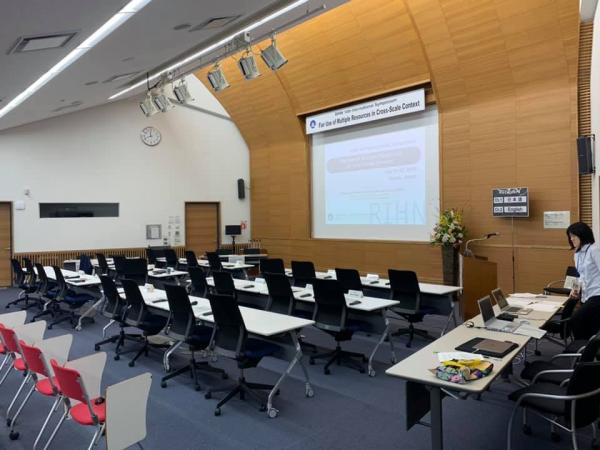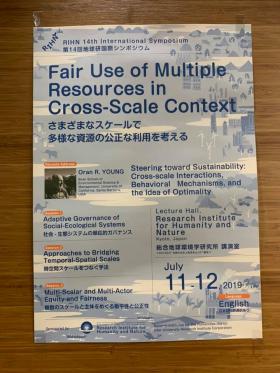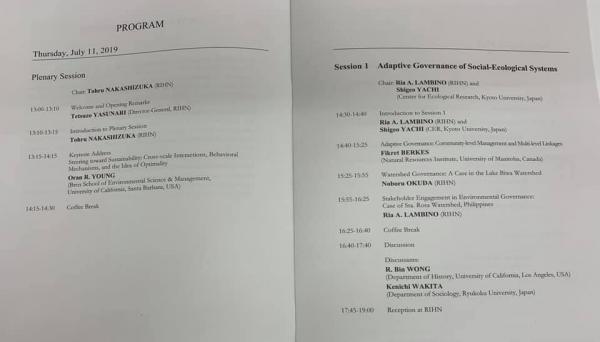第14回地球研国際シンポジウム「Fair Use of Multiple Resources in Cross-Scale Context」

 ◼︎先週の金曜日、総合地球環境学研究所で第14回地球研国際シンポジウム「Fair Use of Multiple Resources in Cross-Scale Context」が開催されました。この国際シンポジウムの概要は以下の通りです。
◼︎先週の金曜日、総合地球環境学研究所で第14回地球研国際シンポジウム「Fair Use of Multiple Resources in Cross-Scale Context」が開催されました。この国際シンポジウムの概要は以下の通りです。
Global environmental problems are inter-related each other. The production, circulation and consumption of resources should be discussed in relation to a range of spatial scales, and stakeholders should be involved in these discussions. The linkage among stakeholders through a resource are not always very clear. Citizens in a city, farmers, and the forest managers in upstream are interlinked through water utilization. A supply chain of a product may connect the suppliers and consumers in global scale. Sometimes they do not recognize their connections, and cause unfairness of resource use.
We need to take socio-ecological issues into account relating to human well- being, and fairness and/or equity in resource use to attain sustainable systems. Approaches to make the connections among stakeholders visible and effective governance involving stakeholders in various spatial scales are necessary to attain fair resource use.
In this symposium, we try to discuss the issues on fair resource use from watershed scale to global, in particular focusing on the (1) resource management governance considering human well-being, (2) necessary tools and system to attain sustainable resource use in multi-scale, and (3) fairness and equity for resource use among multi-stakeholders in multi-scale from the legal, economic and ethical perspectives.
◼︎これまでもこのブログで報告してきましたように、私は、地球研のプロジェクトに参加していることから、この国際シンポジウムのセッション1「Adaptive Governance of Social-Ecological Systems」で討論者を務めました。以下が、セッション1のプログラムです。
Session 1 Adaptive Governance of Social-Ecological Systems
This session overviews and discusses the basic ideas, current status and future agenda of adaptive governance for multi-scale issues. Special attention will be paid to how the adaptive governance can reconcile the different needs (well-being) or agenda of stakeholders dispersed at different spatial levels. Case studies on governance from watersheds, etc. will be introduced.
Chair: Ria A. LAMBINO (RIHN) and Shigeo YACHI (Center for Ecological Research, Kyoto University, Japan)
14:30-14:40 Introduction to Session 1
Ria A. LAMBINO (RIHN) and Shigeo YACHI (CER, Kyoto University, Japan)14:40-15:25 Adaptive Governance: Community-level Management and Multi-level Linkages
Fikret BERKES(Natural Resources Institute, University of Manitoba, Canada)15:25-15:55 Watershed Governance: A Case in the Lake Biwa Watershed
Noboru OKUDA (RIHN)15:55-16:25 Stakeholder Engagement in Environmental Governance: Case of Sta. Rosa Watershed, Philippines
Ria A. LAMBINO (RIHN)16:25-16:40 Coffee Break
6:40-17:40 Discussion
Discussants: R. Bin WONG(Department of History, University of California, Los Angeles, USA.)
Kenichi WAKITA(Department of Sociology, Ryukoku University, Japan)
◼︎今回の国際シンポジウムはあまり前向きな気持ちになれなかったのですが、様々な事情から討論者をお引き受けしました。というのも討論者とはいっても、3つの発表のうち、自分が参加しているプロジェクトを基にした発表が2つだったので、私自身がプロジェクトに提供してきた様々なアイデアやプロジェクトの基本的なフレームに関して、フォローをするという役割だったからです。とはいえ、発表者のお1人であるFikret BERKESさんの発表内容は、私の考え方とも共振するところがあり、ある意味で、プロジェクトの背中を押していただけたような気持ちになりました。 BERKESさんは、この国際シンポジウムが終了した後、私たちの研究調査のフィールドを訪問されたようです。私は、授業や地域連携事業(社会学部の「大津エンパワねっと」)の用務があり、残念ながらご一緒することはできませんでしたが、どのような感想やご意見を持たれたのか、プロジェクトの研究員の方達にお聞きしてみようと思います。
